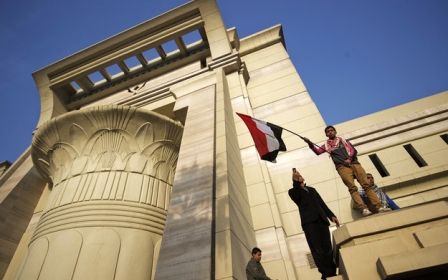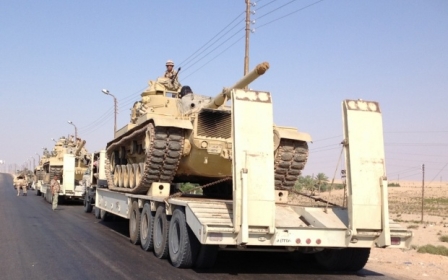Egypt's President Sisi celebrates 'success' at UN assembly in landmark speech

“The Egyptian people shared in the success that happened in New York. They supported me and told the world that Sisi is not alone.”
Egypt’s President Abdel Fattah al-Sisi, who recently passed the landmark of his first 100 days in office, was speaking on Wednesday at a ceremony in Cairo to mark the 41st anniversary of the 1973 Arab-Israeli war.
The speech, which took place at the Egyptian Military Academy, featured a “military salute” to the Egyptian people.
Sisi recently returned from his first official visit to the US since winning a controversial presidential poll in May with an overwhelming majority of 93 percent of the vote, in an election marred by low turnout.
He travelled to the US to take part in the United Nations General Assembly in New York.
Within the first two minutes of his speech before world leaders at the assembly, Sisi denounced the Muslim Brotherhood, condemning “the exclusion…and tyranny of a faction which, in the name of religion, put its narrow interests before the interests of the people.”
He told viewers that “our aim is to build a new Egypt, a state that respects rights and freedoms…and ensures the coexistence of its citizens without exclusion or discrimination.”
On the arrival of his convoy to New York, he was greeted by a small crowd of supporters, who shouted “We support Sisi” and “Long live Egypt”, Sisi’s slogan during the recent election campaign.
Sisi also received a warm welcome from US President Barack Obama, who selected him as one of a small number of foreign leaders whom he chose to meet one-on-one on the fringes of the assembly.
In an open letter published on Thursday, an influential Washington think-tank warned that Obama’s decision would be “understood around the world, and in Egypt, as a formal blessing for a leader who carried out a military coup against an elected government.”
The Carnegie Endowment for International Peace’s Working Group on Egypt also warned that unless Obama raised issues such as “unlawful killing, imprisonment, torture” in the intimate meeting, it would be taken “as a sign to Egyptians that the United States has given its blessing to the ongoing massive campaign of repression and human rights abuses.”
In his speech in Cairo on Wednesday, Sisi told spectators at the stadium and viewers around the country that “I confirmed to everyone in my visit to New York that neither I nor anyone else can work against the will of Egyptians in Egypt.”
He said that the aim of the trip had been to present “the new Egypt to the entire world.”
Sisi also celebrated the fact that “the majority of the world’s countries have recognised what happened in Egypt”, thought they had taken some time to do so.
Opposition figures have questioned Sisi's vision of a "new Egypt", as protesters continue to take to the streets almost nightly and thousands of activists remain in the country's jails.
Analyst Maha Azzam, who also heads newly-established opposition body the Egyptian Revolutionary Council, told MEE that neither the situation in Egypt, nor Sisi's rhetoric, is new.
"This speech is nothing new - it's very much an assertion of the same line he continues to affirm about his legitimacy. It is ultimately a typical response from a coup leader.
"He trumpets his international recognition, when he knows that recognition for this regime is based on very shaky ground. What we heard at the UN and what we hear consistently from Sisi is a man absolutely desperate to show that he is a legitimate leader."
However, Azzam does think that Sisi's welcome in New York undermines the United Nations as a body.
"A military dictator was welcomed by the Secretary General of the United Nations. That he was welcomed so soon after the Human Rights Watch report into the Raba'a massacre, which called for Sisi to be investigated for possible war crimes in Egypt, calls into question the credibility of the Secretary General and the whole body of the UN."
Azzam warned that the perception among Sisi's supporters of his "success" in gaining international support for his government could be dangerous.
"It's not about the international community gaining more leverage over Sisi by lending his government legitimacy. The major players, like the US and the European Union, need to reconsider their strategic interests and what they are saying to fragile democracies the world over with their support for military regimes."
For the Egyptian opposition though, according to Azzam, Sisi's speech on Wednesday and his visit to New York do not mark a significant turning-point.
"The struggle for the opposition inside Egypt and outside it goes beyond any state visit or international recognition from any head of state.
"Ultimately the struggle is one for rights and one for freedoms. The struggle will take a long time and will not be affected by the manoeuvres of a dictator who may visit one country or another."
New MEE newsletter: Jerusalem Dispatch
Sign up to get the latest insights and analysis on Israel-Palestine, alongside Turkey Unpacked and other MEE newsletters
Middle East Eye delivers independent and unrivalled coverage and analysis of the Middle East, North Africa and beyond. To learn more about republishing this content and the associated fees, please fill out this form. More about MEE can be found here.



